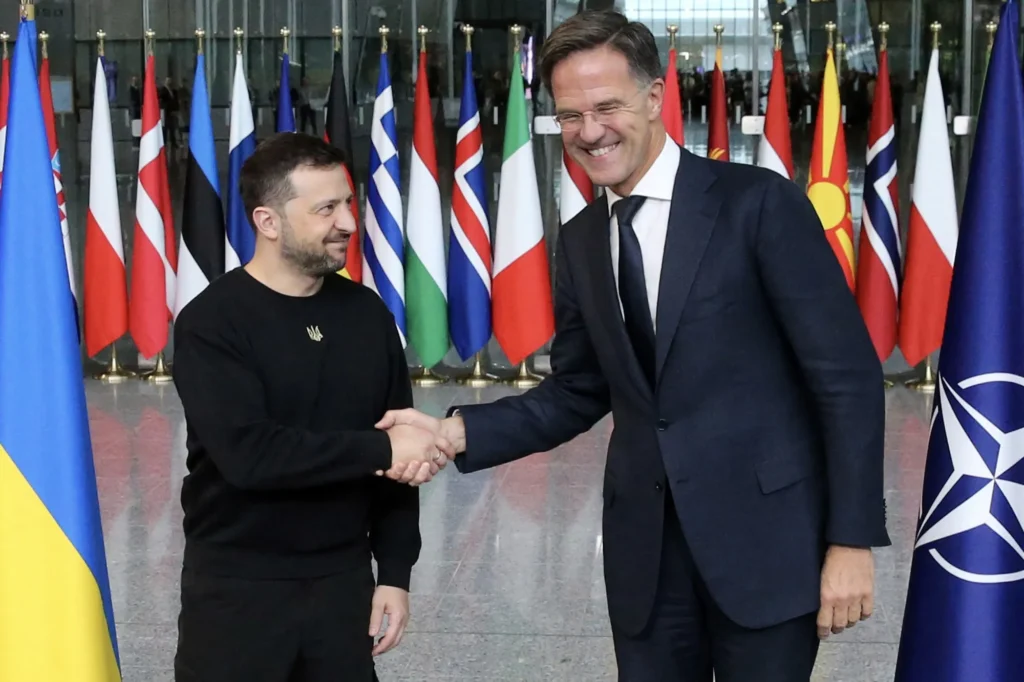NATO Secretary‑General Mark Rutte has pledged to Ukrainian President Volodymyr Zelensky that the alliance is ready to maintain its military support for Ukraine for a decade or more. The announcement, made during the Munich Security Conference, comes amid escalating tensions with Russia.
During a bilateral meeting held at the Munich Security Conference this week, Rutte reaffirmed NATO’s long-term commitment to Ukraine, telling Zelenskyy that Kyiv can “count on the alliance” and its military backing for “as long as it takes.”
“We can continue for ten years or more,” Rutte reportedly told Zelensky. “We will provide everything you need to continue this fight.”
NATO assures 10-year Security Pact
Rutte’s remarks follow the March 2024 signing of a 10-year bilateral security agreement between the Netherlands and Ukraine. That pact included a €2 billion military aid package, focused on air defense, artillery systems, naval support, and F-16 fighter jets. The agreement also laid the groundwork for long-term economic, legal, and judicial cooperation between the two countries.
Rutte, who recently succeeded Jens Stoltenberg as NATO’s leader, is now spearheading efforts to translate bilateral agreements into broader NATO-wide commitments, especially as Ukraine continues to press for eventual membership in the alliance.
The Dutch leader emphasized that NATO countries must be prepared not only for continued support of Ukraine but also for the possibility that Russia may challenge NATO territory within the next five years.
He called for increased defense spending among NATO members, suggesting that the current 2% of GDP target may not be enough to counter future threats. Some nations, he argued, should aim for defense budgets of 3.5% or more.
“This is about a quantum leap in NATO’s readiness,” Rutte said, warning that “without decisive investment in air defenses and ammunition production, we risk being caught off guard by Moscow’s next moves.”
US unity with alliance
Rutte’s strong words were aimed not just at Ukraine’s adversaries, but also at its allies—especially as the political landscape in the United States becomes increasingly uncertain ahead of the upcoming presidential election.
He encouraged Zelensky to maintain open channels with both current and potential future U.S. administrations, including President Donald Trump, in order to preserve bipartisan American support.
“This is not the time to go it alone,” Rutte said, referring to both European and American cooperation. “We stand united, and we will not lose that unity.”
Rutte and Zelensky are expected to continue discussions at the upcoming NATO summit in The Hague, where long-term support structures for Ukraine—and stronger deterrents against Russian aggression—are at the top of the agenda.
Russia Response
Moscow responded swiftly. The Kremlin, via spokesman Dmitry Peskov, cautioned that under Rutte’s leadership, NATO policy will remain unaltered and adversarial. He reminded that “the Netherlands took a rather irreconcilable position” toward Russia, and warned that NATO’s strengthened posture could provoke further escalation—especially if weapon systems targeting deep Russian territory are deployed.
Former Russian President Dmitry Medvedev, now Deputy Chairman of the Security Council, escalated the rhetoric further. He denounced Ukraine’s existence as “mortally dangerous,” labeling the country a mere assembly of Russian lands and vowing continued conflict to correct this perceived historical aberration
President Vladimir Putin, in a separate address at the St. Petersburg Economic Forum, described Ukraine as artificially constructed and reiterated that Moscow aims to establish a buffer zone in eastern Ukraine. He affirmed Russia would recognize Ukrainian sovereignty only if Kyiv relinquishes NATO ambitions and cedes territory—including regions seized since 2014.
With the war entering its fourth year and no end in sight, Rutte’s comments mark a significant shift in tone: from managing a crisis to preparing for a prolonged geopolitical standoff and Russia too seems to be prepared to face the alliance.
